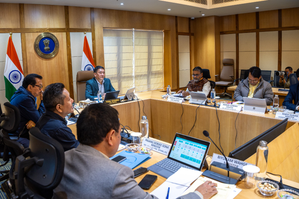Madhya Pradesh launches new logistics policy to pare exports goods haulage

Bhopal, Feb 16 (IANS) In a move to boost exports and slash transportation costs for exporters, the Madhya Pradesh government has unveiled its comprehensive multi-pronged Logistics Policy 2025.
This cutting-edge policy aims to enhance logistics efficiency, foster a seamless supply chain, and establish world-class infrastructure throughout the state.
Even though Madhya Pradesh has four-dry ports, it still remain dearer for importers for being a land-locked state vis-à-vis other states at seashore.
The Madhya Pradesh Logistics Policy-2025 is set to be a catalyst for the state’s economic growth.
By positioning Madhya Pradesh as a premier logistics hub, the policy aims to attract investors and spur trade, promising substantial economic elevation in the years to come.
To bolster infrastructure, the state government will establish over 20 cargo terminals, enhancing the logistics network with state-of-the-art facilities to ensure smooth freight movement.
Reduced transportation costs will drive profitability for businesses and attract increased investments.
Enhancing export capacity is a pivotal component of the Logistics Policy-2025.
The policy includes the development of export parks with attractive incentives for developers, such as full reimbursement of stamp duty and registration fees, financial aid up to Rs 40 crore or 50 per cent per acre for infrastructure development, and up to 25 per cent or Rs 25 crore for establishing common pre-processing facilities for exporters.
The policy also champions green industrialisation, encouraging zero-liquid discharge waste management systems and centralised waste management systems with a 50 per cent reimbursement incentive.
To foster exporter participation, the policy promotes export diversification, improves efficiency in export-oriented units, and strengthens export-focused logistics infrastructure.
Objectives include boosting export volumes, increasing the value of ‘Made in Madhya Pradesh’ products, and creating job opportunities within the logistics sector.
To ensure smooth implementation, the government will focus on reducing port turnaround times, enhancing supply chain efficiency, and introducing a PCS-One system for electronic delivery orders. These measures will streamline logistics processes and increase transparency.
Dedicated Food Safety and Standards Authority of India (FSSAI) laboratories will be established to maintain safety and quality standards. Innovations such as Radio Frequency Identification (RFID) doors will bolster security and expedite goods movement.
The Unified Logistics Interface Platform (ULIP) will ensure seamless data exchange across the logistics value chain.
A key feature of the policy is the introduction of the Green Card Scheme, which offers expedited approvals for logistics operators who adopt green transportation practices.
Chief Minister Mohan Yadav emphasised the significance of this initiative, highlighting its potential to fortify the state’s economy and draw investors to the upcoming Global Investors Summit (GIS).
CM Yadav said that by 2030, the new policy would align Madhya Pradesh’s logistics costs with global standards, making it one of the most favoured destinations for both domestic and international businesses.
By reducing logistics costs, the policy will directly benefit traders and entrepreneurs, leading to job creation in warehouses, transportation, and logistics companies.
This presents a golden opportunity for domestic and international investors. Lower logistics costs will also provide better transportation and storage facilities for farmers’ produce.
This forward-thinking policy is poised to transform Madhya Pradesh into a logistics powerhouse, driving economic growth, sustainability, and global competitiveness.
–IANS
shashikant/pgh




